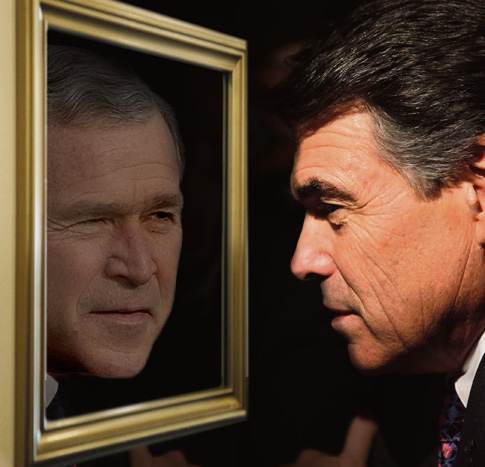|
The Doppelgängers from west Texas
This afternoon I sent this e-mail to a few people:
I’m watching the video of Perry’s announcement. What I’m about to say is not a prediction, but a passing thought, nothing more than that: I think Bachmann will win the nomination. Romney doesn’t stand for anything. Perry would seem to have an advantage over Romney, in that he has a stronger ideological profile, but I think that his Texas persona, especially his hard Texas accent with its absence of diphthongs (for example “lahk” instead of “like,” or “Washington’s desahr,” instead of “Washington’s desire”), after eight years of the same from Bush, will turn people off. Also, like Bush, Perry does the evangelical Christian thing, and, like Bush, he mixes it with the neoconservative thing. [And see this comment for the close fit between evangelical Christianity and neoconservatism.] All this makes him too similar to Bush.Shortly after I sent that e-mail, James N., who had not seen it, sent this to me:

Wikipedia tells us:
A doppelgänger is a tangible double of a living person in fiction, folklore, and popular culture that typically represents evil. In the vernacular, the word has come to refer to any double or look-alike of a person. [LA adds: Note that in the title of this entry I am not merely calling Bush Perry’s Doppelgänger, but am calling them both Doppelgängers, because they seem like doubles of each other.]
Thomas Bertonneau writes:
I have a theory in respect of Mitt Romney that is at least as plausible as the Doppelgänger theory in respect of Rick Perry. Romney’s hair, perhaps too often lacquered, became an entity, a primitive but powerful one, in its own right. The hair “uploaded” Romney’s personality, what there was of it, into itself, deleted it, and “downloaded” itself into the now-inert body. For some time Romney has been his hair. This process is a new variant of body snatching, which has afflicted American politics for many decades (since 1956, to put a date on it). I am still investigating what occult causality produced Hillary Clinton. Posted by Lawrence Auster at August 15, 2011 10:14 PM | Send Email entry |